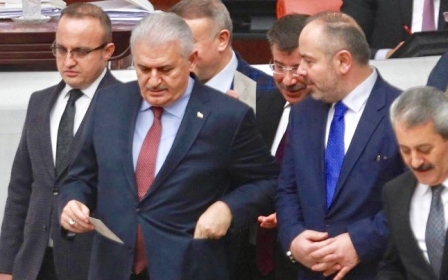Turkey’s constitutional changes? They're a threat to our democracy

Today, what tops Turkey’s political agenda are the constitutional amendments that would abolish the president's ceremonial role and give him the most vital executive powers in the country.
Our deputies will consider any member of parliament who agrees to the proposed amendments as a traitor to the Turkish people
There is no doubt that the government’s proposal for these reformss will lead us to regime change.
Today, Turkey is under a state of emergency; the cost of criticising the government and President Erdogan is extremely high. The private property of Turkish citizens – including bank accounts - can be confiscated at any moment. Our citizens are living in constant fear of being arrested arbitrarily. It is therefore important to understand that Turkey is attempting to undertake this constitutional change during a very difficult time.
The ruling Justice and Development Party’s (AKP) proposal has nothing to do with a true presidential system, for which the US is a positive and democratic example. Although the AKP claims that their proposal leads us to a presidential system similar to that of the US, there are stark differences between the two.
First of all, in the US, the presidential system is built upon a clear separation of powers. Neither the executive, nor the legislative bodies can terminate one another. Secondly, the president cannot issue a law without the approval of Congress. This means that the president is subject to checks and balances within the system.
Thirdly, the appointment of cabinet members and high-level bureaucrats in the US is subject to the approval of the Senate. Fourthly, one of the most distinct aspects of the US’s governmental system is its budgeting process which is independent from the president.
A hyper-presidency
But in Turkey, the situation will be very different. If passed, the amendments would lead to a transfer of legislative powers to the president giving him the authority to enact decrees on any given issue. He would also have the power to appoint the majority of the members of the Constitutional Court, Turkey’s highest court which, among other responsibilities, oversees impeachment hearings.
The president will also have the authority to appoint the head of the Supreme Board of Judges and Prosecutors, the body in charge of all judicial appointments. At the same time, budgeting processes would be completely handed over to the president. Furthermore, if a budget was rejected, the parliament would have no authority to correct it.
In short, with the proposed changes for the Turkish constitution, the government aims to give most of the legislative, executive, and judicial powers to one person - the president, which would terminate any separation of powers in Turkey.
READ: Will Erdogan be president until 2034?
For this reason, it goes without saying that this proposal is an obstacle in the way of any democratic system. This is because the proposed constitutional amendments aim to establish a "one-man regime", a dictatorship. To put it more concretely, the proposal is looking to bring a hyper presidency to Turkey.
Away from democracy
The fundamental parameters of a constitution which the People's Republican Party (CHP) would support must maintain a parliamentary system, provide a system of check and balances, ensure an independent judiciary and guarantee civic freedoms, a welfare state and the separation of powers.
If the parliament accepts this proposal, it would open the way for the transformation of the Republic of Turkey into a one-party, one-man regime
If the parliament accepts this proposal, it would open the way for the transformation of the Republic of Turkey into a one-party, one-man regime. Abolishing the parliamentary system, which protects the sovereignty of the country, would destroy the will of our people.
This proposal moves Turkey away from a democracy. It would eliminate the independence and neutrality of the judiciary. Turkish people could lose their fundamental rights and freedoms by the signature of one man – the president’s. CHP deputies will therefore consider any member of the parliament who agrees to the proposed amendments as a traitor to the Turkish people.
READ: Turkey’s deepest divide? It may be the clash over 'lifestyle choice'
As CHP deputies, we have continued to express our concerns about the constitutional amendments. The aim of Turkey is to establish a Western-type democracy. We will continue to be staunch advocates of a liberal and pluralistic parliamentary system.
The Republican People’s Party is struggling to protect and preserve our people’s will and their desire for a democratic Turkey. We hope that we can regain our country’s bright future.
- Muharrem Erkek is Çanakkale province deputy for the Republican People’s Party (CHP) – the main opposition party in Turkey – and a member of the constitutional committee. Muharrem graduated from the Faculty of Law at Istanbul University.
The views expressed in this article belong to the author and do not necessarily reflect the editorial policy of Middle East Eye.
Photo: People walk next to a Turkish national flag at the historical grand bazaar on 2 December 2016 in Istanbul (AFP)
Middle East Eye propose une couverture et une analyse indépendantes et incomparables du Moyen-Orient, de l’Afrique du Nord et d’autres régions du monde. Pour en savoir plus sur la reprise de ce contenu et les frais qui s’appliquent, veuillez remplir ce formulaire [en anglais]. Pour en savoir plus sur MEE, cliquez ici [en anglais].






